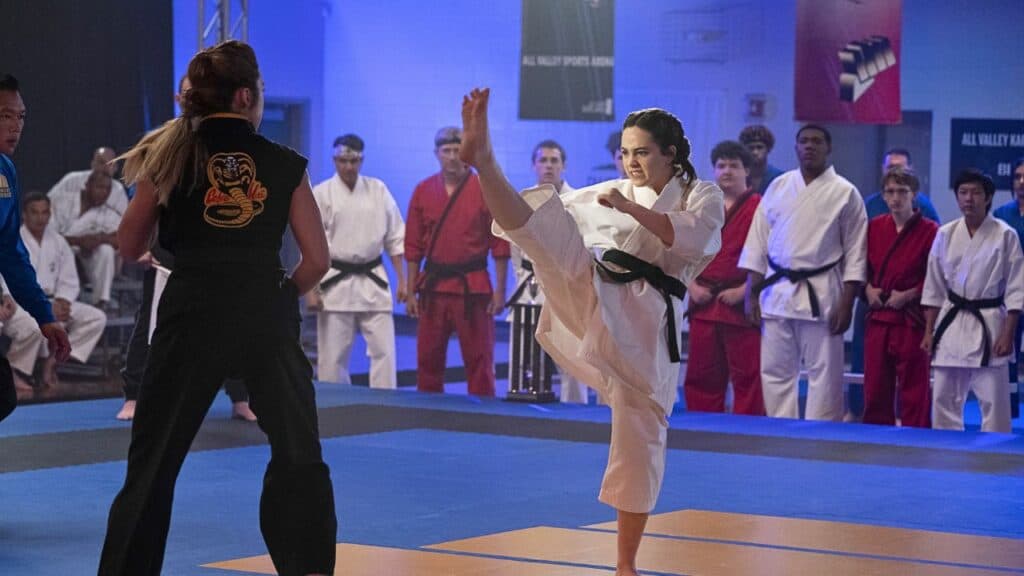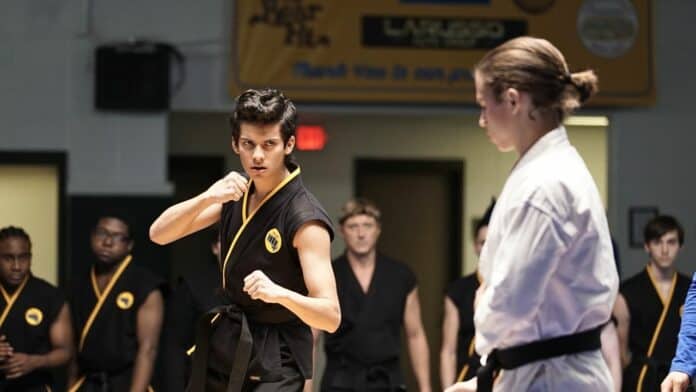Cobra Kai is a martial arts dramedy and a successor to the Karate Kid movies. The series is streaming on Netflix.
In the riveting series Cobra Kai, a continuation of the Karate Kid saga, the dynamics of rivalry play a central role.
The show delves deep into the psychological aspects of its characters, particularly focusing on the complex rivalries that drive the narrative.
This article explores the psychological underpinnings of these rivalries in Cobra Kai, providing insights into what makes these conflicts so compelling and relatable.
Unresolved Past Conflicts
Echoes of Adolescent Rivalries
Cobra Kai rekindles the old rivalry between Daniel LaRusso and Johnny Lawrence, which began in their teenage years.
The persistence of this rivalry into adulthood in Cobra Kai reflects a psychological phenomenon where unresolved conflicts from youth can linger and resurface later in life.
This aspect of their rivalry demonstrates how past experiences, especially those in formative years, can have a lasting impact on individuals.
The Quest for Identity and Self-Worth
Defining Oneself Through Rivalry
In Cobra Kai, the characters often define their identities through their rivalries.
For Johnny, his rivalry with Daniel is a way to redeem his past failures and regain a sense of self-worth.
Similarly, Daniel sees his rivalry with Johnny as a means to preserve the legacy of Mr. Miyagi and his teachings.
This aspect of Cobra Kai illustrates the psychological concept that individuals often use rivalries as a framework to define themselves and their values.
Projection and Misunderstandings
Misinterpretation of Intentions
Cobra Kai effectively showcases how misunderstandings and the projection of one’s insecurities can fuel rivalries.
Johnny and Daniel often misinterpret each other’s actions, leading to escalating conflicts.
This element of Cobra Kai is a nod to the psychological theory of projection, where individuals ascribe their own negative traits or insecurities to others, often exacerbating conflicts.
The Influence of Mentors and Role Models
Impact of Mentoring Styles
The rivalry in Cobra Kai is not limited to Johnny and Daniel; it extends to their students as well.
The differing mentoring styles of the two protagonists create a ripple effect, influencing the attitudes and actions of their students.
This aspect of Cobra Kai underscores the psychological impact mentors and role models have on shaping individuals’ perspectives and behaviors, particularly in a teacher-student dynamic.
The Role of Competition and Ambition
Healthy vs. Destructive Rivalry
Cobra Kai explores the thin line between healthy and destructive competition.
While the show depicts how rivalries can motivate individuals to improve and excel, it also highlights the dangers of rivalries becoming obsessive or vindictive.
This dual portrayal in Cobra Kai aligns with psychological theories that suggest while competition can be a positive driving force, it can also lead to negative outcomes if not balanced with empathy and understanding.

Conclusion
Cobra Kai provides a rich tapestry of rivalries that are deeply rooted in psychological concepts.
The series not only entertains but also offers insights into the human psyche, particularly in relation to unresolved conflicts, identity formation, projection, mentorship, and the nature of competition.
Through its nuanced portrayal of rivalries, Cobra Kai resonates with audiences, offering a deeper understanding of the psychological factors that drive human conflicts and relationships.
Also Read: How Cobra Kai balances nostalgia and new storytelling

